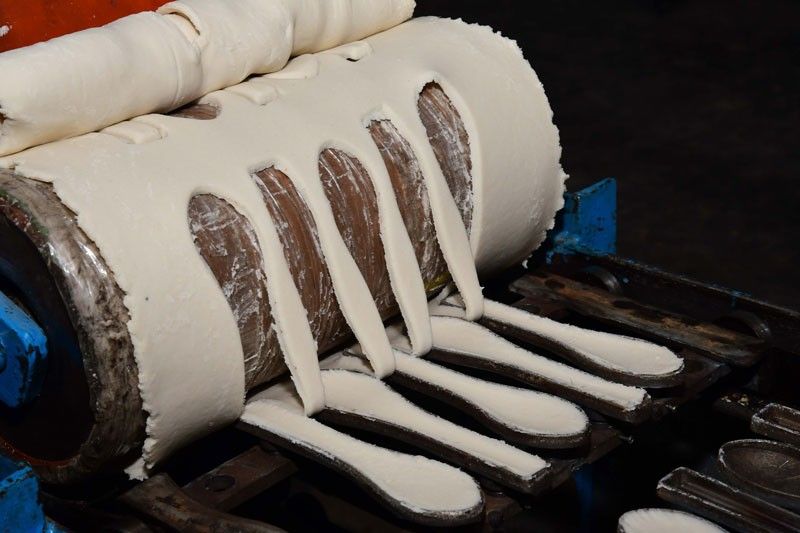Edible spoons to address plastic problem

INDIA – In 2005, while he was on a field visit to Mahabubnagar, a drought-prone district in Telangana, India, Narayana Peesapaty ordered a jowar roti (millet bread) for lunch. He arrived late at lunch, and the roti had become cold and hard.
“I had to break the roti and scoop the dal and curry with its pieces, crunching into them. That was the eureka moment for me. If a two-dimensional spatula can work, then why not a three-dimensional spoon? I felt that I would be able to hit two birds in one shot," Peesapaty said.
The birds he was referring to are two major issues: the need to reduce the acreage used for water-intensive rice cultivation in India, and the global problem of plastic pollution, as well as its misuse. Though the material is not intrinsically bad, Peesapaty explained that plastics should not be used for handling food, since they contain chemicals with carcinogenic and neurotoxic properties that leach into what we eat.
Edible cutlery was his solution, and he founded a company called Bakeys to produce it.
Bakeys manufactures spoons made primarily from jowar, a millet flour, and rice and wheat flour in three flavours - savoury, sweet and plain. Peesapaty said, “As an agricultural scientist, I want this world to be a better place to live.”
His wife, Pragyna Keskar, said the spoons are safe to eat and “taste like crackers.”
Even if they are not eaten, they are safe to dispose into the environment, as they are biodegradable.
Poor people in India have traditionally eaten millets as a staple and rice on special occasions such as festivals. Rice thus became an aspirational food until the mid-1980s, when India's policy of subsidising energy to the agricultural sector began.
Since then, rice cultivation has grown exponentially and millets have lost their important place on the table.
In 2016 the Indian government procured nearly 50 million tonnes of rice as buffer stock – nearly one-third of the total rice produced in the country.
“The rice is rotting in warehouses and nobody cares. Something is wrong,” Peesapaty said, adding that one solution to the impending crisis would be to reduce rice cultivation by 25 percent and encourage millet consumption.
He researched what was happening to used plastic spoons. Looking into garbage bins, he found plastic material and plastic bags but only broken spoons, which indicated that people were reusing them.
“This strengthened my resolve to make edible cutlery and I began experimenting at home,” Peesapaty said. “The kitchen was my laboratory."
He tried making cutlery using different combinations of flour. When he finally got the combination right, he had difficulty finding a mould maker. Then it was a struggle to find investors.
“Those were very bad days. Friends and relatives started avoiding me as I was asking them for money,” he recalled. “We have seen the worst.”
He sold some of his assets, including a house in Vadodara and a flat in Hyderabad. He used his and his wife’s savings.
The couple raised more than 20 million Indian rupees (USD 300,000) on their own; it was not until 2014 that they got a bank loan. In the meantime, Keskar had taken up other jobs to supplement their income.
“I share his passion for making edible spoons. So does his mother,” she said.
In 2016, Bakeys raised 18.7 million Indian rupees by crowdfunding on Kickstarter and more than 2.4 million Indian rupees on Ketto, thanks to a social media film that went viral.
Bakeys now employs 11 people - eight workers at the factory in the outskirts of Hyderabad, plus an accountant, a web designer and a researcher. It produces 10,000 spoons a day using 500 kg of jowar flour and an equal quantity of rice flour and other ingredients.
Each spoon has a production cost of four rupees, including distribution. Since its launch, the company has sold 2.2 million spoons. More than 120 countries are currently trying to place orders, but Bakeys is not accepting them.
“Our web site is meant to take orders but it has stopped as we can't supply,” Keskar said, adding that the mismatch between demand and supply is huge.
The company’s largest orders come from the United States, United Kingdom, Canada, Australia, Dubai, Singapore, Taiwan and China.
“We don't want to do more. Now we want to sell machines and teach them [buyers] to use them. Let them sell it under their own brand because we can't do huge bulk production with just one machine,” Peesapaty said, adding that the machines will cost 1.4 million Indian rupees apiece. Profits from these sales will help pay for Bakeys to expand its product line from cutlery to crockery.
Bakeys’ patent has been pending since 2012. “I realised that the world had woken up to our products, but our prototype to mass produce edible spoons took two years to perfect,” said the entrepreneur. “Now we are ready.” Prashanth Chintala (The Hindu)
- Latest
- Trending

































